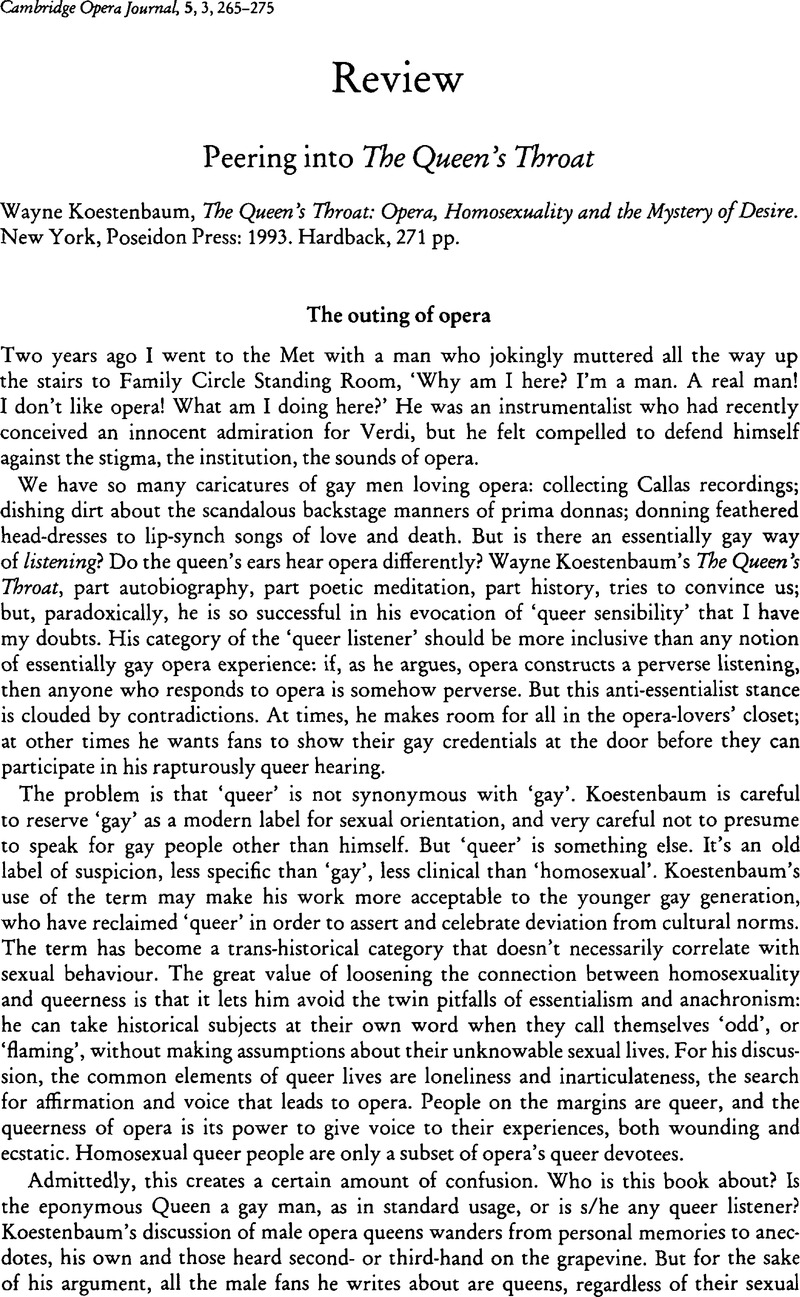Article contents
Wayne Koestenbaum, The Queen's Throat: Opera, Homosexuality and the Mystery of Desire. New York, Poseidon Press: 1993. Hardback, 271 pp.
Review products
Published online by Cambridge University Press: 27 August 2008
Abstract

- Type
- Review
- Information
- Copyright
- Copyright © Cambridge University Press 1993
References
1 Koestenbaum, Wayne, ‘Ode to Anna Moffo’ and Other Poems (New York, 1990).Google Scholar
2 Poizat, Michel, The Angel's Cry: Beyond the Pleasure Principle in Opera, trans. Denner, Arthur (Ithaca, 1992)Google Scholar; Castarède, Marie-France, La Voix et ses sortilèges (Paris, 1987).Google Scholar
3 This vision governs Cone's The Composer's Voice (Berkeley, 1974)Google Scholar; and, more subtly, ‘Three Ways of Reading a Detective Story’ (1977), in Music: A View from Delft (Chicago, 1989).Google Scholar
4 Cone set forth his taxonomy of listeners in ‘The Silent Partner’, an informal lecture at Princeton University, 04 1993.Google Scholar
5 I regret that I cannot quote from McClary's unpublished analysis of Schubert's ‘Unfinished’ Symphony as a homosexual narrative, which she presented under the title ‘Making a Difference’, at the 1990 conference of the American Musicological Society. However, she makes a similar argument about Tchaikovsky in her Feminine Endings (Minneapolis, 1991)Google Scholar: ‘What we have [in the Fourth Symphony] is a narrative in which the protagonist seems victimized both by patriarchal expectations and by sensual feminine entrapment … Such a narrative resonates strongly with Tchaikovsky's biography’ (p. 77).
McClary's justification of her musical analysis as Tchaikovsky's autobiographical statement seems to me somewhat forced, and there are broader problems with any reading of musical structures as ‘narratives’. However, those problems are beyond the scope of this essay, and Carolyn Abbate has already outlined them in Unsung Voices (Princeton, 1991), 19–29.Google Scholar
6 This is one strain of Abbate's discussion of Wagner, in Unsung Voices, 156–249.Google Scholar
7 Ross's, Alex review, ‘Grand Seductions’, The New Yorker (12 04 1993), 115–20Google Scholar, considers Koestenbaum's neglect of King Ludwig, Parsifal and Britten at some length. However, he does not pursue the implications of Koestenbaum's obvious lack of interest in opera without girls, graciously leaving those questions for me to take up.
8 Again, Koestenbaum seems unaware that this territory has been explored before. Paul Robinson has argued a similar position in ‘A Deconstructive Postscript: Reading Libretti and Misreading Opera’, Reading Opera, ed. Groos, Arthur and Parker, Roger (Princeton, 1988), 328–46.Google Scholar
9 Clément, Catherine, Opera, or the Undoing of Women, trans. Wing, Betsy (Minneapolis, 1988), 12, 62.Google Scholar
10 Clément, 28.
11 Casting, he implies, can make the identification more intense: ‘who dares to have a crush on Carlo Bergonzi, even though in an ad for Aida he is young and dark-eyebrowed, a masculine goody-goody with a vein visible on his broad-palmed hand?’ Evidently, Koestenbaum dares.
12 Kramer, Lawrence, ‘Culture and Musical Hermeneutics: The Salome Complex’, this journal, 2 (1990), 269–94.Google Scholar
13 Cather, Willa, The Song of the Lark (1915; New York, 1991), 351.Google Scholar
14 Hoffmann, E. T. A., ‘The Sandman’, in The Golden Pot and Other Tales, trans. Robertson, Ritchie (Oxford, 1992), 113.Google Scholar
15 Koestenbaum, , Ode, 50.Google Scholar
16 Castarè;de, , 179–84.Google Scholar
17 Rich, Adrienne, ‘For Julia in Nebraska’, in A Wild Patience Has Taken Me This Far (New York, 1981), 17.Google Scholar
- 1
- Cited by


